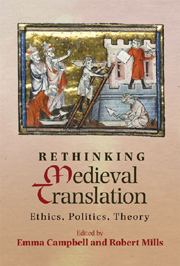Book contents
- Frontmatter
- Contents
- List of Illustrations
- List of Contributors
- Acknowledgements
- Introduction: Rethinking Medieval Translation
- 1 On Not Knowing Greek: Leonzio Pilatus's Rendition of the Iliad and the Translatio of Mediterranean Identities
- 2 Translation and Transformation in the Ovide moralisé
- 3 Translating Lucretia: Word, Image and ‘Ethical Non-Indifference’ in Simon de Hesdin's Translation of Valerius Maximus's Facta et dicta memorabilia
- 4 Translating Catharsis: Aristotle and Averroës, the Scholastics and the Basochiens
- 5 The Ethics of Translatio in Rutebeuf's Miracle de Théophile
- 6 Invisible Translation, Language Difference and the Scandal of Becket's Mother
- 7 Medieval Fixers: Politics of Interpreting in Western Historiography
- 8 The Task of the Dérimeur: Benjamin and Translation into Prose in Fifteenth-Century French Literature
- 9 The Translator as Interpretant: Passing in/on the Work of Ramon Llull
- 10 Rough Translation: Charles d'Orléans, Lydgate and Hoccleve
- 11 Bueve d'Hantone/Bovo d'Antona: Exile, Translation and the History of the Chanson de geste
- Untranslatable: A Response
- Bibliography
- Index
2 - Translation and Transformation in the Ovide moralisé
Published online by Cambridge University Press: 05 April 2013
- Frontmatter
- Contents
- List of Illustrations
- List of Contributors
- Acknowledgements
- Introduction: Rethinking Medieval Translation
- 1 On Not Knowing Greek: Leonzio Pilatus's Rendition of the Iliad and the Translatio of Mediterranean Identities
- 2 Translation and Transformation in the Ovide moralisé
- 3 Translating Lucretia: Word, Image and ‘Ethical Non-Indifference’ in Simon de Hesdin's Translation of Valerius Maximus's Facta et dicta memorabilia
- 4 Translating Catharsis: Aristotle and Averroës, the Scholastics and the Basochiens
- 5 The Ethics of Translatio in Rutebeuf's Miracle de Théophile
- 6 Invisible Translation, Language Difference and the Scandal of Becket's Mother
- 7 Medieval Fixers: Politics of Interpreting in Western Historiography
- 8 The Task of the Dérimeur: Benjamin and Translation into Prose in Fifteenth-Century French Literature
- 9 The Translator as Interpretant: Passing in/on the Work of Ramon Llull
- 10 Rough Translation: Charles d'Orléans, Lydgate and Hoccleve
- 11 Bueve d'Hantone/Bovo d'Antona: Exile, Translation and the History of the Chanson de geste
- Untranslatable: A Response
- Bibliography
- Index
Summary
J'ai ajouté un manteau à l'autre, ça flotte encore, mais n'est-ce pas la destination de toute traduction?
[I have added one coat to the other, it is still floating, but isn't that the destination of all translation?]
The Ovide moralisé is an extraordinary text which translates, amplifies and moralizes Ovid's Metamorphoses. Whereas Latin is the language of learning in the early Middle Ages, the rise in demand for translations of Latin works into the vernacular to be held in libraries of the French-speaking aristocracy in the fourteenth century implicitly presents French as the idiom of Christian wisdom and virtue. By translating a pre-Christian text, the Ovide moralisé participates in this cultural interest in translation, but also explores more explicitly the ethical stakes of translation by transforming Ovid's metamorphoses into revelations of Christian truth. In this essay, I propose to read the dialogue between French and Latin, as it is played out in the exchange between the Ovide moralisé and the Metamorphoses, in the light of Jacques Derrida's reflections on translation in his article ‘Des tours de Babel’, which is itself, in part, a reading of Maurice de Gandillac's translation of Walter Benjamin's essay ‘Die Aufgabe des Übersetzers’ [The Task of the Translator].
- Type
- Chapter
- Information
- Rethinking Medieval TranslationEthics, Politics, Theory, pp. 41 - 60Publisher: Boydell & BrewerPrint publication year: 2012



